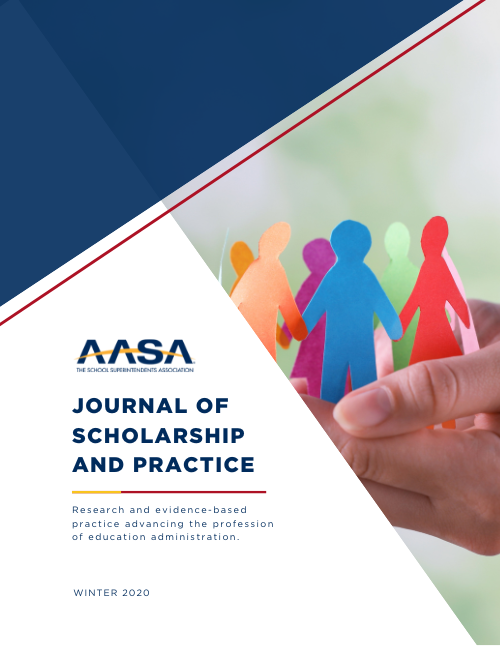2023 Spring Journal of Scholarship and Practice

In this issue, Ken Mitchell, editor of the Journal, writes in his editorial titled “Regret Reduction through Prevention: Leadership Lessons” that leaders with a sense of obligation use the lessons learned from regret as an advantage. He continues, “In the spring 2023 issue of the AASA Journal of Scholarship and Practice, our practitioner-researchers examine areas that relate to preventative leadership through understanding that might assist in minimizing leadership regrets.”
The first article is an evidence-based practice piece titled “Fair Use or Fair Game: The (Distance) Educator’s Dilemma” by Barbara Hickman. This article explores and explains the requirements for policy makers, site and district leadership, and classroom instructors regarding the use of digital, copyrighted materials in the ever-expanding growth of virtual learning environments. Understanding the changes in the law and ensuring a systematic review to ensure that policies are not only current but are being applied is critical to prevent significant and regrettable liabilities.
The second article, “Evaluation of a Social Determinant of Health: Academic Achievement through Physical Education Policy,” is a research piece written by Vanessa Rodriguez, Daniel Gutmore, David Reid, and Erick Alfonso. They explore national associations of PE policies and academic achievement on standardized tests through a fixed effects panel data analysis. The authors suggest principles and practices for conflict-agility to ultimately generate a critical mass that produces a more deeply committed, cohesive school, a place where collaborative work leads to greater engagement. Such leadership, if effected well, is the kind that can serve to shift the current climate and minimize leadership errors and regrets.
ChatGPT and A.I is the basis of the research-informed commentary “The Rise of ChatGPT and Generative A.I and What it Means for Schools” by Ryan Fisk. An informative overview of the rise of ChatGPT and generative A.I. offers cautions along with opportunities for educators from current and future A.I. iterations. “Technology is evolving fast, and so too, educators must be prepared and ready to evolve as well,” Risk says. In the piece, readers learn that within two months ChatGPT reached 100 million active users—the fastest growing consumer internet application in history.
The issue concludes with a book review by Karen Salmon, the retired commissioner of education for the State of Maryland. She examines From Conflict to Collaboration, written by retired superintendents Rob Feirsen & Seth Weitzman.
The editors of this issue are grateful for the contributions made by the writers and believe these articles contribute to enhancing this issue as we begin our 20th volume.
Advertisement
Additional Articles
-
 Regret Reduction through Prevention: Leadership Lessons
Regret Reduction through Prevention: Leadership LessonsMost of us regret decisions we have made in relationships, education, finances, and careers. If only I knew then, what I have learned since.
-
 Fair Use or Fair Game: The (Distance) Educator’s Dilemma
Fair Use or Fair Game: The (Distance) Educator’s DilemmaDuring (and after) the lockdowns of the Covid-19 pandemic, educational communities have employed distance education to reach their students.
-
 Evaluation of a Social Determinant of Health: Academic Achievement through Physical Education Policy
Evaluation of a Social Determinant of Health: Academic Achievement through Physical Education PolicyThis study explores national associations of PE policies and academic achievement on standardized tests through a fixed effects panel data analysis.
-
 The Rise of ChatGPT and Generative A.I. and What it Means for Schools
The Rise of ChatGPT and Generative A.I. and What it Means for SchoolsAs with calculators, search engines, and other innovations, educators should be aware of the capability of generative AI, and continue to adapt and refine instructional and administrative practices to keep learning meaningful and authentic.
Thanks and Appreciation
Special thanks to Kenneth Mitchell, Manhattanville College, for his efforts in selecting the articles that comprise this professional education journal and lending sound editorial comments to each volume.
whose responsibility it is to carry out the mission of school districts in the education of children.
Interested in submitting an article? Learn more here
Additional Resources
- Browse the latest resources on the all new AASA.org
- Access the latest advocacy updates on The Leading Edge Blog
- Read the latest issue of School Administrator magazine
- View upcoming AASA events and programs
Advertisement
Advertisement



